It's on fire again! The drawbacks of electric vehicle batteries' "blind box" model have erupted? This really needs to be addressed!
![]() 11/04 2024
11/04 2024
![]() 526
526
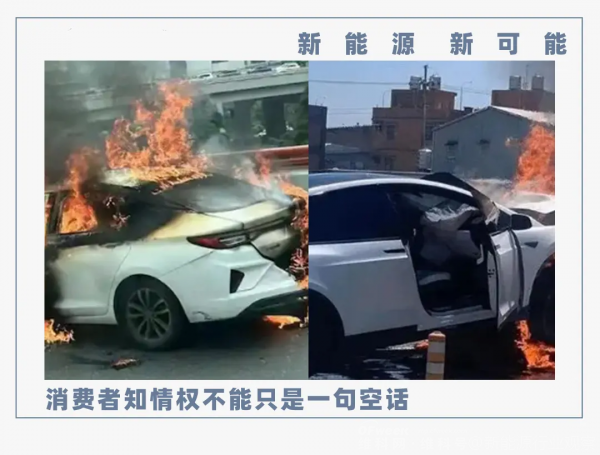
New Energy Outlook (ID: xinnengyuanqianzhan) Original
Full text: 2559 words, reading time: 7 minutes
Follow us first, remember to "Like" and "View
New energy vehicles continue to surge ahead, with a penetration rate exceeding 50% for three consecutive months. However, behind this robust momentum, there is an urgent issue that poses a significant risk that needs to be addressed—when purchasing new energy vehicles, consumers often do not know which brand of battery their vehicle uses, akin to "opening a blind box".
Spending the same amount of money on the same car, which looks identical, may conceal different battery components. The car I bought comes with a battery known for its performance, quality control, and high safety factor; the one you bought might come with a battery from an inferior brand, with a poor reputation, subpar performance, and a history of spontaneous combustion incidents.
Same money, same car, full of tricks. The key is that you are kept in the dark before purchasing the car.
The "blind box" model of electric vehicle batteries not only seriously violates consumers' right to know but also poses a ticking time bomb to the lives and property safety of car owners.
This issue really needs to be addressed!
1. The Battery Mystery: An Untold Secret
At around 5:30 am on October 29, a fire broke out in the underground garage of a residential complex in Shuangliu District, Chengdu City, pushing ZEEKR into the spotlight again due to another fire incident.
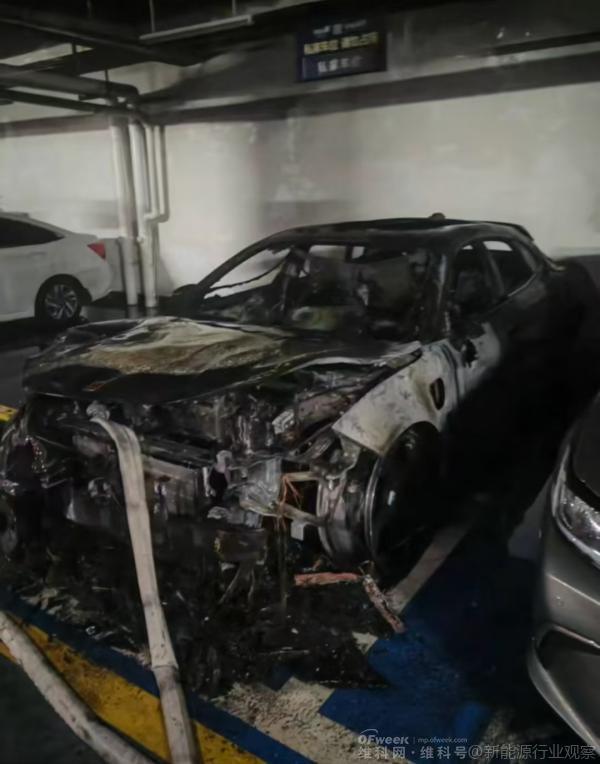
Image/Underground garage on fire
Source/Internet New Energy Outlook Screenshot
Surprisingly, the car was not started or charging; the owner was sound asleep upstairs. No one touched it, and it just spontaneously combusted in its parking spot. The fire left only a charred husk and also damaged the cars of innocent neighbors.
An informed source revealed that the car was equipped with a Sunwoda battery cell. Although the specific cause of the accident is still under further investigation, this is one of several similar incidents involving the ZEEKR brand. Battery mixing has also rendered ZEEKR's marketing claim of "zero spontaneous combustion" a thing of the past.
In fact, many automakers currently in the market engage in similar practices as ZEEKR: they do not explicitly inform consumers about the specific battery brand used in their vehicles during the sales process. This means that even if the same price is paid, the same electric vehicle model in different batches or configurations may come with batteries of varying performance and value.
This practice confuses and dissatisfies consumers, making it feel like a high-risk gambling game. When an electric vehicle spontaneously combusts, consumers only learn about the specific battery brand used in their vehicle from the relevant department's investigation.
More than two months ago, an electric vehicle caught fire in the underground parking lot of an apartment building in Cheongnyangni-dong, Incheon, South Korea. Consumers only then found out that their car batteries had been swapped for another brand.
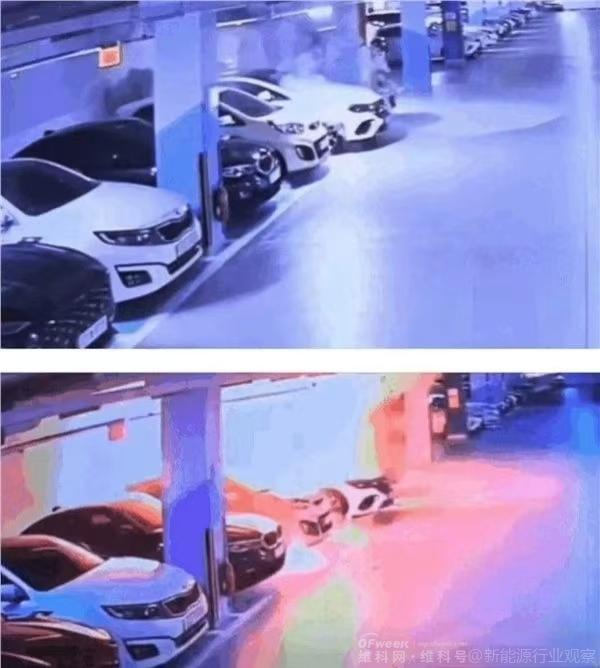
Image/Cheongnyangni-dong, Incheon, South Korea
Source/Internet New Energy Outlook Screenshot
Recently, multiple consumers in South Korea have taken legal action, suing Mercedes-Benz and other related parties.
In contrast, domestic automakers seem to be more blatantly engaging in "mixing" practices, forcing car buyers to accept so-called "unfair terms".
The reason why companies are reluctant to disclose the list of battery suppliers is primarily due to considerations of protecting business secrets and supply chain management strategies.
On the one hand, high-quality battery suppliers are often sought after by major automakers, and disclosing relevant information may lead competitors to take targeted measures. On the other hand, to ensure supply stability and reduce costs, manufacturers often choose to cooperate with multiple suppliers simultaneously and flexibly adjust procurement ratios based on actual conditions.
Therefore, in the absence of mandatory requirements, most automakers tend to remain silent.
2. Consumer Rights Violated, Betting with Lives
From a legal perspective, the "Law of the People's Republic of China on the Protection of Consumer Rights and Interests" clearly stipulates that consumers have the right to know the true situation regarding the commodities they purchase, use, or the services they receive.
However, in practical operations, due to the lack of specific implementation rules and effective regulatory mechanisms, many consumers find it difficult to obtain accurate information about the core component of electric vehicles—batteries. When quality issues or safety accidents occur, consumers are often in a passive position and find it challenging to safeguard their legitimate rights and interests.
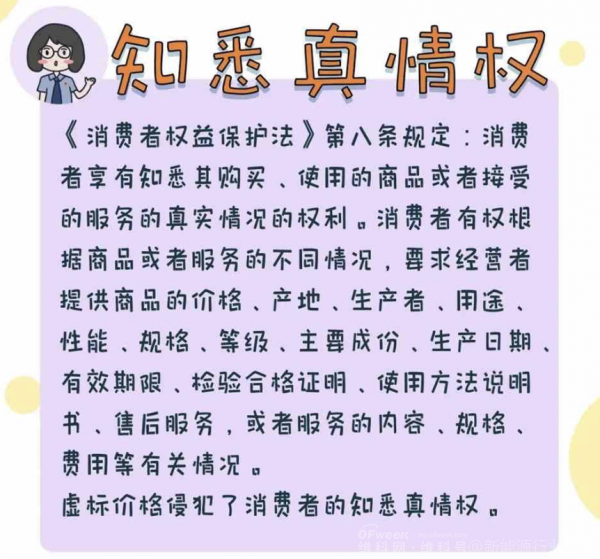
Image/Consumer Rights - Right to Know
Source/Internet New Energy Outlook Screenshot
Furthermore, due to the inability to fully understand the actual configuration of the purchased vehicle, potential safety hazards also increase. According to China Quality Daily, there were over 100 electric vehicle spontaneous combustion accidents nationwide in 2022, most of which were related to battery failures.
In recent years, the price war in the new energy industry has intensified. To reduce costs and increase efficiency, some unscrupulous enterprises resort to using low-quality components without guaranteed quality, even tampering with key components such as power batteries, engaging in deceitful practices by not disclosing, informing, or being transparent. This not only misleads consumers but also poses significant hidden dangers for their future use of the vehicles.
In fact, the peculiar phenomenon of electric vehicle batteries being like "blind boxes" is not merely a lack of consumer right to know at the legal level.
Both the spontaneous combustion incident of a Mercedes-Benz in an underground parking lot in South Korea and the spontaneous combustion incident of a domestic new energy vehicle in an underground garage have resulted in the emergency evacuation of multiple residents and even hospitalizations.
This is "driving with one's life on the line" and "betting with lives." Battery blind boxes pose a severe threat to the lives, property safety, and public safety of consumers.
According to a research report released by J.D. Power, up to 75% of potential electric vehicle buyers indicated that they would reconsider purchasing an electric vehicle if they could not obtain sufficient battery information.
It is evident that increasing battery information transparency has become one of the crucial factors driving the healthy development of the industry. In the long run, this opaque operating model will inevitably damage the industry's reputation, thereby affecting its sustainable development. After all, only by building trust can more consumers be attracted to join the ranks of green travel.
3. It's Time Someone Addressed This "Absurdity"
Faced with the increasingly prominent issue of "battery blind boxes," the existing laws and regulations are obviously no longer fully adapted to the current situation's development needs. Although relevant departments have begun to pay attention and have taken some measures, such as strengthening product testing and raising entry barriers, there are still significant gaps in information disclosure.
Therefore, it is necessary to further improve the relevant legal system, clearly requiring all enterprises producing and selling electric vehicles to disclose the sources of all major components used, especially key components related to safety performance such as batteries, on their official websites or other easily accessible places. At the same time, penalties for violations should be increased to ensure effective implementation of the regulations.
Specifically, we can draw lessons from the European Union's approach. In 2021, the European Union issued the "Battery Regulation," requiring all electric vehicles sold in the EU to provide detailed battery information, including key parameters such as supplier names, capacity, and energy density.
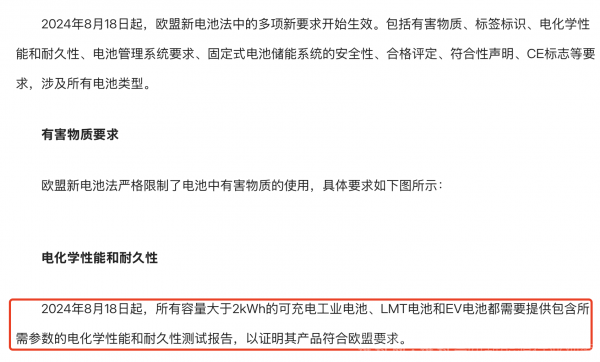
Image/New EU Battery Regulation
Source/Internet New Energy Outlook Screenshot
This initiative has greatly enhanced market transparency and boosted consumer confidence. Domestically, legislative means can also be employed to require enterprises to clearly indicate the battery brand and related technical indicators in sales contracts and establish a dedicated information inquiry platform for easy access by consumers at any time.
Industry associations should also play a more active role by formulating unified standards and norms, guiding member units to proactively disclose more information to consumers, and establishing specialized agencies responsible for supervising implementation.
For example, the China Association of Automobile Manufacturers can take the lead in establishing a battery information disclosure alliance, encouraging member enterprises to voluntarily participate and regularly releasing industry reports showcasing the performance data of various battery brands. Additionally, expert teams can be organized to conduct independent testing on mainstream models on the market, providing authoritative references for consumers.
For ordinary citizens, they can actively participate in this process by forming specialized organizations and utilizing online platforms, jointly creating a fair and equitable consumer environment. Social media and forums are excellent channels for dissemination, where consumers can share their car-buying experiences and encountered problems, forming public opinion pressure to prompt enterprises to make improvements. At the same time, the media should also play a supervisory role, promptly exposing violations and promoting social attention.
Only when forces from all parties converge into a powerful driving force can the phenomenon of "electric vehicle battery blind boxes" be taken seriously and fundamentally addressed, thereby safeguarding the healthy development of the new energy vehicle industry in China and even worldwide.
In summary, the absurdity of "electric vehicle battery blind boxes" really needs to be properly addressed!








